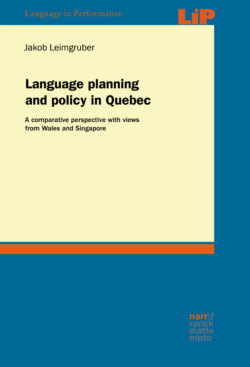Читать книгу Language planning and policy in Quebec - Jakob Leimgruber - Страница 16
На сайте Литреса книга снята с продажи.
2.2 Canada: an officially bilingual country
ОглавлениеUnder French colonial rule, French was obviously the de facto official language in New France. The Conquest of 1760 led to the Treaty of Paris in 1763, which formalised the transfer of sovereignty from France to Britain. Its effects were felt in large parts of the world where the two colonial powers were fighting for supremacy, also, therefore, in North America. The previously French subjects became British subjects, with obvious repercussions on the legal framework that moved from French civil law to British common law and on the religious order, with Catholicism (severely opposed by the British) now no longer state religion. The religious issue, in fact, proved to be a major concern: with British rule also came British laws, among them the requirement (dating to 1559), for senior civil and public servant, to take an oath of allegiance rejecting the Catholic faith. This was unacceptable to a large majority of Catholic French Canadians. In the larger colonial context of the brewing displeasure in the nearby thirteen American colonies (soon to erupt in full-blown revolution), the British were anxious to secure the support of the Quebec population; the provisions of the Quebec Act 1774 sought to do so. This act, in addition to extending the Province of Quebec beyond the Great Lakes (to be bounded by the rivers Mississippi and Ohio, i.e. the old borders of New France without Louisiana), removed references to religion from the oath of allegiance, and declared that subjects in the province ‘may have, hold, and enjoy, the free Exercise of the Religion of the Church of Rome’ (i.e., Catholicism, Quebec Act 1774, s V); the Catholic Church was also allowed to collect tithes again. Further, it restored the use of French civil law for private law, although British common law was maintained for public law.
Language is not explicitly mentioned in the Quebec Act, perhaps because French was, at the time, the single language of the overwhelming majority of residents in the province. Similarly, French still held the status of a diplomatic language, and was also spoken (in addition to English) by colonial administrators. Nonetheless, a passage in the act can be seen as granting language rights (my emphasis):
[A]ll His Majesty’s Canadian Subjects within the Province of Quebec […] may also hold and enjoy their Property and Possessions, together with all Customs and Usages relative thereto, and all other their Civil Rights, in as large, ample, and beneficial Manner, as if the said Proclamation, Commissions, Ordinances, and other Acts and Instruments had not been made, and as may consist with their Allegiance to His Majesty, and Subjection to the Crown and Parliament of Great Britain […] (Quebec Act 1774, s VIII)
The ‘customs and usages’ may be interpreted to include the French language as customarily and usually spoken in the conquered territory. Furthermore, the French civil laws reinstated with the act were, obviously, written in French, so that by recognising them as laws applicable to the province, their French version would become official, giving French automatically de facto official status.
A century later, the British North America Act 1867 enacted a form of bilingualism at the federal level, without specifically mentioning ‘official’ languages. Its section 133 permitted the use of either English or French in the federal Parliament as well as in the Quebec Legislature; also, both languages could be used in federal and Quebec courts. Records kept and acts passed should be printed and published in both languages, with both versions having force of law.
Yet a century later, with patriation, the statuses of English and French as co-official languages of Canada were reaffirmed and strengthened in the Canadian Charter of Rights and Freedoms (CCRF). This charter forms a part (Part I) of the Constitution Act, 1982 (itself a part (Schedule B) of the Canada Act 1982, a UK parliamentary act), which, together with the BNA Act 1867, forms the bulk of the Canadian constitution.1
The wording in the charter is as follows:
English and French are the official languages of Canada and have equality of status and equal rights and privileges as to their use in all institutions of the Parliament and government of Canada. (Constitution Act, s 16(1))
This constitutionally enshrined bilingualism is applicable to ‘all institutions of the Parliament and government of Canada’ (i.e., federal Parliament and government) in the entire country. Further constitutional linguistic provisions in the CCRF include the bilingual status of the province of New Brunswick (see section 2.4 below), a list of language rights in dealing with institutions of the federal government and with the judiciary, and issues relating to minority language educational rights (i.e. for speakers of French or English in provinces where their language is a minority language).
